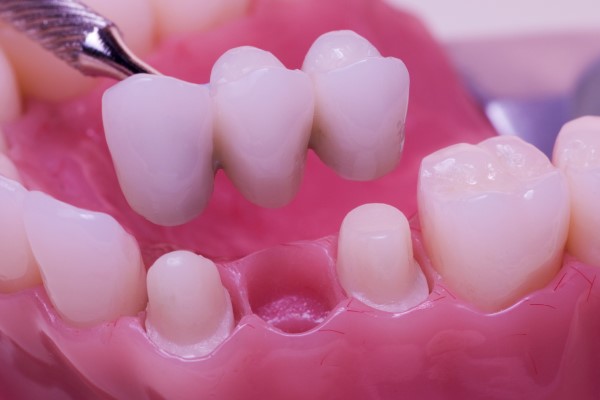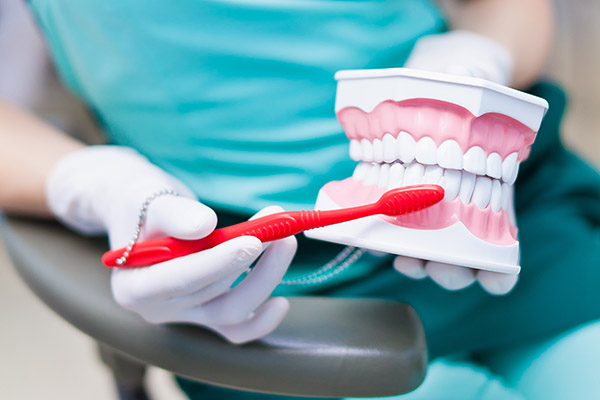Pros and Cons of Dental Bridges

A dental bridge might be recommended for you if you are missing one to three teeth in a row. As their name implies, these oral prosthetics bridge the space left by missing teeth with artificial ones. They are typically made up of two main components: abutments (crowns) used to anchor the appliance and pontics (artificial teeth) that fill up the spaces left by missing teeth.
A dental bridge does not only bridge the space left by missing teeth. It also bridges the difference between implants and dentures. In terms of missing teeth replacement options, implants are the closest thing to real teeth, but they are the most expensive option. Dentures are the most affordable option, but they do not feel as natural as implants.
Bridges are somewhere between these two devices. They are not as expensive as implants, but they feel more natural in the mouth than dentures.
Things to consider before getting a dental bridge: Pros and cons
Thinking about replacing your missing teeth with a bridge? Let's go over their pros and cons so you can make an informed decision.
Pros
Some of the benefits of choosing dental bridges over other missing teeth replacement options include:
- Does not require surgery: Unlike implants, replacing missing teeth with bridges does not require oral surgery. The only exception would be for an implant-supported bridge
- Faster teeth replacement compared to implants: The traditional process of getting a dental bridge takes about the same time as it does to get dentures: about two weeks. Getting implants can take as long as six months since bone tissues around the restoration need to fuse with it
- More affordable than implants: Implants are the priciest way to replace missing teeth. A single implant typically costs more than a bridge used to replace multiple teeth. Dental bridges are more expensive than dentures, but many patients find the extra costs worth it given the improved comfort and function of bridges
- Improved stability over dentures: Dental bridges are significantly more secure in a patient’s mouth than dentures. Dentures are known to shift in the mouth even when nasty-tasting dental adhesives are used. They are also known to fall out of the mouth when eating or speaking. Just imagine how embarrassing that would be in public. Bridges, on the other hand, are anchored down to crowns placed on the teeth closest to the gap, so they do not move in the mouth, making them feel more natural
Cons
There is no such thing as a perfect dental restoration, and bridges are not an exception. Some of the disadvantages of dental bridges include:
- Installation sometimes requires altering healthy teeth: Dental bridges are typically anchored down to the teeth closest to the space left by missing teeth. These teeth are usually covered up with crowns to provide better stability for the bridge. The placement of crowns involves removing enamel from teeth to create a better fit. This is a permanent change that cannot be reversed in the future, meaning the teeth will always need crowns to serve as their artificial enamel moving forward
- Bridges do not stop bone loss deterioration: Bone tissues in the jaw need regular stimulation to remain healthy just like muscles in the body. They lose this stimulation when teeth fall out, leading to bone tissue breakdown. This can lead to changes in a person’s facial structures and the formation of wrinkles and fine lines. Bridges do not help to prevent this bone tissue breakdown like implants do
- Bridges do not last as long as implants: Implants are usually made out of titanium and are designed to last a lifetime. The only thing people with implants might have to change at some point is the crown that sits on the implant to replace a missing tooth. These crowns last up to 25 years, while bridges only last about 15 years
- Pricier option than dentures: If saving money is high on a patient’s priority list, dentures are the more economical option. Dentures are nowhere as comfortable as bridges, but they do replace missing teeth
What to expect when getting dental bridges
Getting dental bridges usually involves patients sitting in a dental chair while a dentist injects them with a local anesthetic to start the procedure. The teeth that will be used as abutments are prepared by removing enamel from them or filling up hollow areas.
A rubber mold is used to make an impression of the gap in the patient’s smile and the teeth around it. The impression is sent to lab technicians who make oral prosthetics in a lab. It takes about two weeks for the finished product to get back to the dentist.
The patient gets a temporary bridge while they wait for their custom appliance. During the second appointment, the temporary bridge is removed and replaced with the customized bridge to complete the treatment.
Restore your smile with a bridge
Tired of having a gap in your smile? A dental bridge might be your best option. Call or stop by our Sunnyvale location for a consultation.
Request an appointment here: https://stonecanyondental.com or call Stone Canyon Dental at (972) 996-3191 for an appointment in our Sunnyvale office.
Check out what others are saying about our dental services on Yelp: Dental Bridges in Sunnyvale, TX.
Recent Posts
A dental bridge is one of the tooth replacement options a dentist might recommend to restore missing teeth and a patient's smile. Regardless of the cause of tooth loss—injury, tooth decay, or an oral health condition—tooth loss can make eating inconvenient and even affect a patient's confidence. Once in place, a dental bridge will improve…
While the cost of dental crowns is usually covered by insurance, getting a crown can still be an expensive and time-consuming process. Once the crown is in place, it can be tempting to forget about it and continue your normal habits, but not being mindful of your tooth restoration could lead to you having to…
If you are getting a dental crown, you might be wondering what the procedure involves. During this time, the dentist will work to restore your tooth. That way, you will not need to get the tooth extracted. Keep reading to learn more about what getting a dental crown will involve for you.The process for getting…
If you have teeth that are severely damaged and decayed, dental crowns may be the only option available to preserve them. A crown consists of a cap that is placed over a prepared tooth and cemented permanently in place. The cap is shaped like a tooth to blend in with the others, providing strength, protection,…







